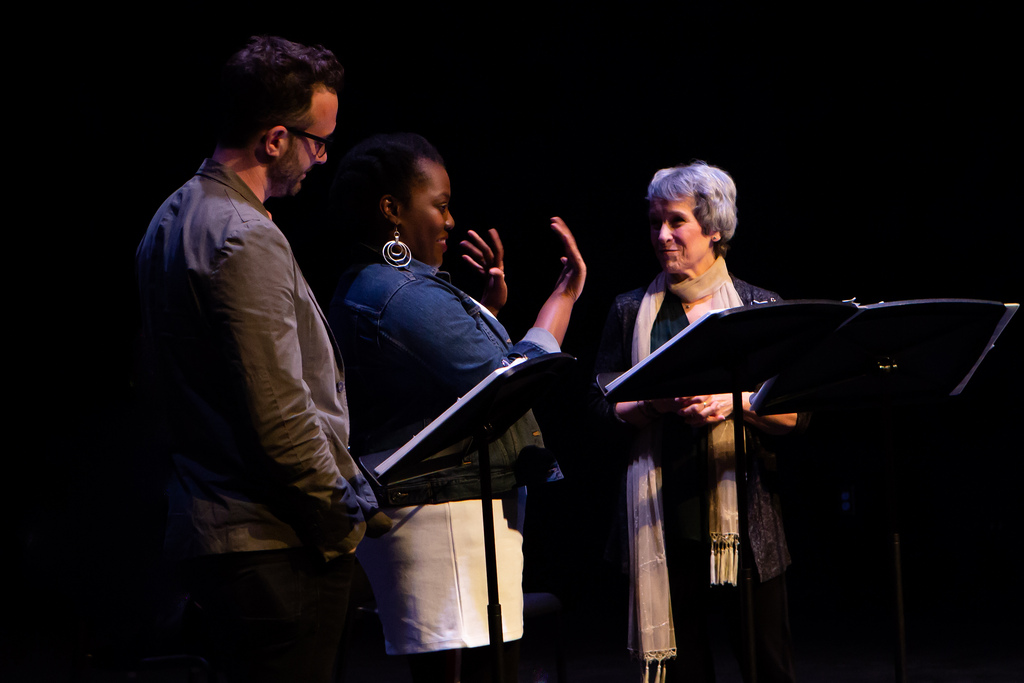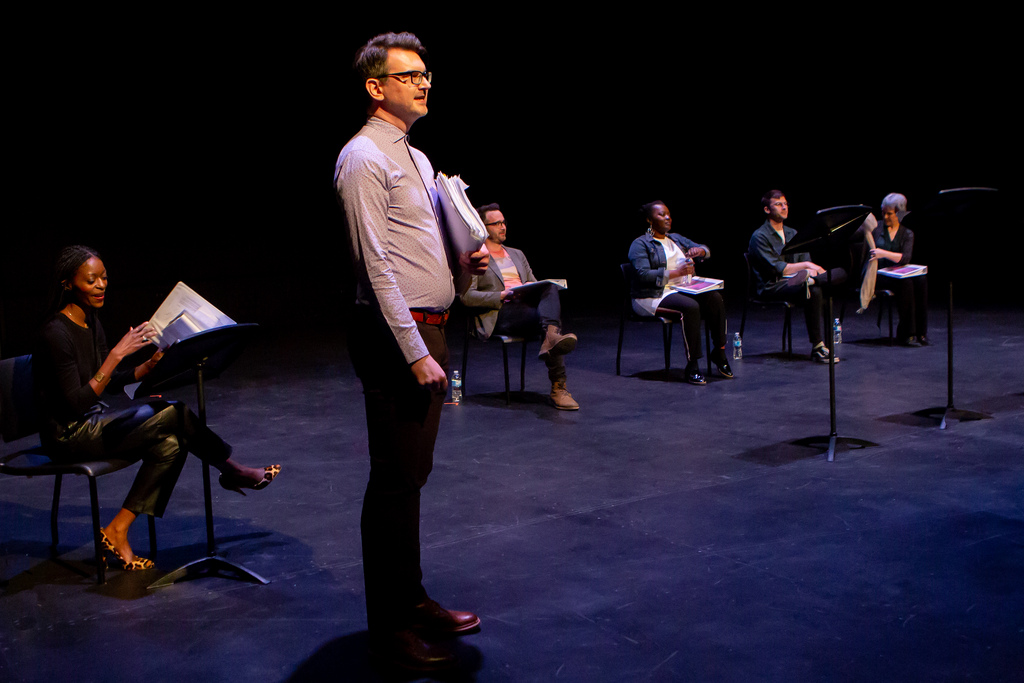Students share their experiences from a workshop with theater professionals
Director Logan Vaughn, dramaturg Ignacia Delgado, and actors Heather Alicia Simms, Eddie Kaye Thomas, Naomi Jacobson, and Jordan Geiger came together at MIT to work with Ken Urban, Senior Lecturer in Music and Theater Arts to workshop his new play, The Immortals. A comedy, The Immortals tells the story of Alice, the only black junior academic in the English department at a mostly-white elite university; as Alice battles her way towards tenure amidst professional and personal obstacles, she cannot stop thinking about the story of Henrietta Lacks, the woman whose immortal cells were exploited by science.
The workshop with theater professionals took place at MIT from March 11-16, 2019 and culminated in two staged readings at the W97 Theater on campus—March 15 & 16—which contributed to the development of Urban’s work-in-progress. Urban was awarded a CAST Fay Chandler Faculty Creativity Grant to complete this project.
For Urban’s playwriting students, who will be workshopping their own plays in preparation for MTA’s upcoming Playwrights Lab April 5-7, this was a unique and exciting opportunity to witness a professional workshop process. The Playwrights’ Workshop students recorded observations and lessons learned from their The Immortals workshop experience:
“This was my first time participating in a professional workshop, as I had limited exposure to theater and drama before coming to MIT…I found it an amazing opportunity to see an actual workshop in action. Throughout this process, I was pleasantly surprised by how organically everything worked. I had thought that the playwright’s creative process was predominantly independent, as they conceived, constructed, and edited their scenes, but…the process is actually incredibly symbiotic, as playwright, director, and actors all work together to make the play truly come to life. Going forward towards Playwrights’ Workshop, I will keep this relationship dynamic in mind, as I will be working with a director and actors to take my own play to the next level.” – Tabrez Alam ’19
“As an Engineering student, my instincts around the theater world all lie in logistics. How do we make sure scene transitions look smooth when set pieces have to move? How do we adjust the timing of light changes so no one is unlit for an unreasonable amount of time? This is my third theater class at MIT (the first two of which were playwriting classes) and my fourth year as a member of the Shakespeare Ensemble, and yet I think only now, taking Contemporary American Theater, am I finally grasping what it means to connect with the artistic part of the theater.” – Kacie Bawiec ’19
“The meaning of a play, at least a good one, in a large part should not be written along the lines, but between the lines—beneath the lines—and this meaning, which may be ambiguous even after the play is performed, is even more so at the beginning of the rehearsal. The director and the cast need to know this meaning—their own version of it—but they will have to learn it with their own empathy, debate, and creation, in the presence of an often quiet playwright. … Throughout the discussion, I realized that the words in the script might mean different things to everyone in the room. …In the end, a play is a recipe, but the performance—the real meal—will be different every time it’s cooked, and will taste differently to everyone.” – Lantian Chen ’19
“Seeing this rehearsal was not only exciting because I was seeing a play in the process of being made, but it also excited me about the future of my own play. I learned that as the playwright, I need to know both the characters and their world inside and out, and I must be prepared to know the answer to any and all questions, while at the same time allowing the director and actors space to interpret the material themselves. I’m excited to also have extended rehearsal time for other people to read and dissect my play, and I’m hopeful that the workshop process will allow me to gain a deeper understanding of the story I am trying to tell.” – Aidan Driscoll ’21

“Beyond the process of the rehearsal, I also thought that the themes within the play were fascinating. …I’m not sure how commonly known the story of HeLa cells are, but I personally first learned about them in a literature class at MIT, where we read the famous book on HeLa cells, which was written by a white woman—The Immortal Life of Henrietta Lacks… the play made me think about [that class], especially when Alice begins the play [by] posing the question, “Do we own our bodies?” …this actually reminded me of a different novel we studied in that class, Dawn by Octavia Butler, in which Lilith, a black female human, is picked against her will to be the first to breed with an alien species… The play made me realize that Henrietta Lacks is a real-world version of Lilith—her body exploited against her will “for the better of humanity”— and she was probably treated in this way because she was black.” – Gina Han ‘19
“Yesterday, I attended Ken Urban’s worksop of his new play The Immortals. (When I say new, I mean new. At one point during the worksop Ken said, “I hope there aren’t many typos… it was a late night.”) This was my first experience at a worksop of a real, full-length play…I believe watching this will be helpful with how I move forward in preparation for my own reading at the MTA Playwrights Lab. Above all else, it was obvious that the director, playwright, and actors were all thinking a lot about the characters. At one point, Ken mentioned a change in the timing of an action. …what was a seemingly minor detail of a character elicited thoughtful and concrete conversations about what changes would need to be made to the production. I hope that this drives me to be more holistic and thoughtful in my construction and execution of character.” – Ryan Hennessey ’21
“The actors dived right in. The table work process was fascinating—the actors were at ease, frequently repeating lines that they wanted to try to deliver differently. Although they were seated, they were in motion; the professor gesticulated with her hands, the college student squirmed in his chair. If ever an actor stumbled, they did not apologize; they simply started over. The director often stopped them for a note or a clarifying question; this was not unusual to me, but the actors, too, would often interrupt their own lines to ask a question about their motivation, about what they could be thinking, why they were saying a certain line. The director would listen and try to explore a possible answer with them: ‘It’s like your brain is moving faster than your words.’” – Nelson Niu ‘20
“The changes mostly consisted of cutting—lots and lots of cutting. I had heard that plays got shorter through the workshopping process, but you don’t believe it until you see pages of dialogues getting thrown out, and the most surprising thing was that the cuts always seemed to work—I think this came down to the actors capturing future dialogue in their performance, making…the dialogue superfluous. I’m somewhat worried for what my play will lose in its workshopping phase, but rationally, I know it’s all part of the process, and it ultimately what is best for the play. … Despite these reservations, I am excited for the workshop of my draft. I can’t wait to see it come to life, performed by professional actors, and watch it improve in real time. – John Strang ’19
Written by MIT Students



